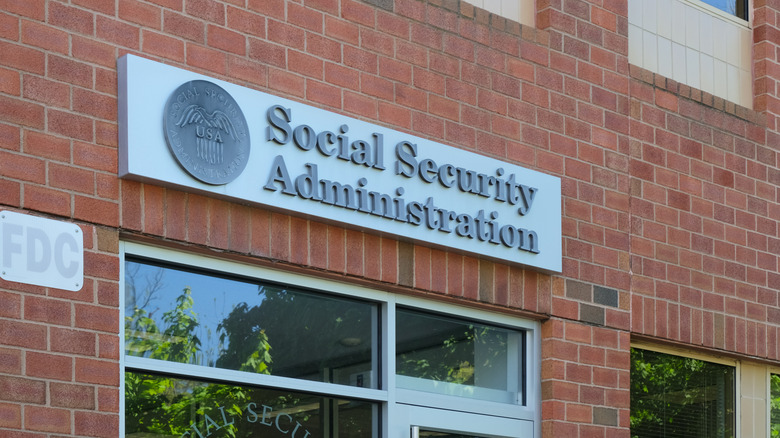Here's What Donald Trump Did With Social Security The Last Time He Was In Office
Since the November 2024 presidential elections, consumers, economists, and analysts alike have all wondered about the potential economic ramifications of another Donald Trump presidency. With a host of policy proposals promised throughout the election, knowing which specific policies President-elect Trump will ultimately make good on could have significant impacts for consumers. While certain financial consequences, like a massive increase in the national debt, are almost guaranteed, other policies, like how Trump plans to handle Social Security, are less clear.
While Trump himself has promised to protect Social Security, the Republican Party (which will experience majority rule in both houses of Congress when the 119th Congress convenes in January 2025) has previously voiced other ideas for how to handle the program. From raising the retirement age to flat out cutting benefits for future beneficiaries, there is a high potential for significant Social Security changes during the next four years. This means that changes could be on the way, and soon, for the almost 68 million monthly Social Security beneficiaries. While watchdog groups like The Committee for a Responsible Federal Budget (CRFB), have already reported that Trump's proposed economic policies would hasten Social Security's insolvency, it can still be helpful to look at Trump's first term in office for clues as to how he might handle the federal program this time around. Plus, as Social Security's budget shortfall looms, it's important to look at what could be next for this massive federal program.
Social Security under Trump's first term
You might be surprised to learn that Donald Trump did very little about Social Security during his first term. Despite many conservative outlets incorrectly claiming that Trump increased Social Security while in office the first time around, the increased cost-of-living adjustments that led to higher monthly benefits amounts for recipients while he was President were (and continue to be) a normal and automatic part of the Social Security program, regardless of who is the sitting President. For instance, Social Security has already announced that beneficiaries will be receiving a 2.5% COLA increase for 2025. These COLA increases are calculated using the Department of Labor's Bureau of Labor Statistics Consumer Price Index, which looks at inflation for consumers. It's worth mentioning that no President has had any influence on Social Security's cost-of-living adjustment amount since COLA first became automatic in 1975. With that said, during Trump's first term he did impact Social Security in a few select other ways, mainly due to the outbreak of the COVID-19 pandemic.
Specifically, his signing of the CARES Act deferred the payroll taxes owed by certain employers while also eliminating the garnishing of delinquent student loan debt from a recipient's Social Security benefits, temporarily at least. This, in the short term, would have significantly damaged Social Security's necessary income in 2020 except for the fact the Act also provided Social Security the $38 million dollars necessary to ensure the solvency of the program's trust funds despite these pandemic related measures.
What's next for Social Security?
While Donald Trump is unlikely to outwardly affect Social Security, many of his economic policies have the potential to greatly alter the federal program's ability to continue long term. Specifically, his policy proposals to eliminate existing taxation on tips, overtime, and Social Security benefits (you read that right, you might be paying taxes on your Social Security benefits amount) could dramatically hurt Social Security's finances. In addition to speeding up the program's insolvency (some experts believe he could speed this up by as much as three years), his policies could also increase the eventual benefit cut that recipients experience upon this insolvency. Not to mention, his proposed tariff policy could lead to significant increases in inflation which would further impact COLA adjustments.
It is also worth noting that many within the Republican Party do have some specific policy suggestions for Social Security. Namely, raising the retirement age to 69 (full retirement age is currently 66 or 67 depending on the year you were born) as a way to save money. However, a report from the Congressional Budget Office found that this increase would lead to overall smaller lifetime benefits for all Social Security recipients. Even worse, changing the retirement age today would leave all workers who are currently in their 30s and 40s with around $3,500 less per year (or, a 13% annual benefit cut). Perhaps most significantly, the report found that changing the full retirement age would not actually save enough money to change the currently predicted 2033 trust fund depletion deadline.


